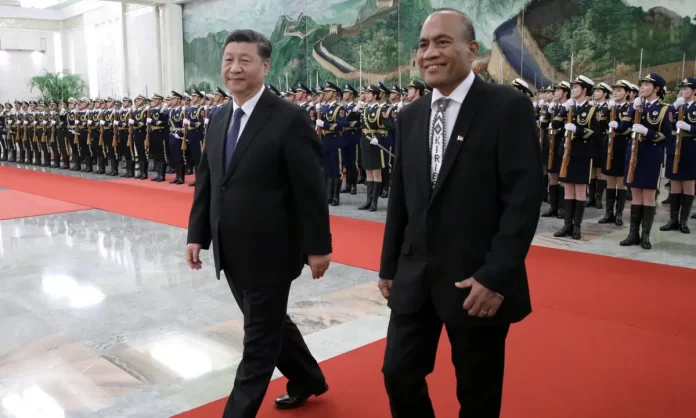A recent global research by AidData revealed a significant increase in China’s development finance support to Kiribati between 2019-2021, coinciding with the island nation’s decision to switch diplomatic ties from Taiwan to China.
According to AidData, which analysed a comprehensive dataset of over 20,000 projects across 165 countries, “100 percent of Chinese development finance was committed between 2019 to 2021.”
Over the past two decades (2000-2021), a substantial portion of China’s total aid and support amounting to USD$114.8 million was directed to Kiribati after it aligned itself with China in September 2019.
The significant increase in Chinese financial support during this period was to fulfill a number of key objectives of President Taneti Mamaa’u diplomatic switch, including the purchase of an aircraft, a vessel and a loan to support and develop Kiribati’s tuna fishing industry.
“In 2021, the Chinese Government reportedly granted US$17,532,549.04 for the purchase of an aircraft from Embraer in Brazil and an additional grant of US$6 million for the acquisition of a tug and barge vessel for the Kiribati National Shipping Line, explained the AidData report.
During the same time, AidData observed a shift in Kiribati’s foreign policy alignment towards China, especially during the early Belt and Road Initiative (BRI) period, with government elites in Kiribati showing increased support for China at the UN General Assembly.
On Kiribati’s debt to China, the report identified a major loan of US$114.53 million from the China Exim bank to Kiribati Tuna Fishing Company in 2019. The project, financed with a mix of debt and equity, was supposed to build five large scale tuna fishing boats and carry out fishing in the waters of Kiribati.
In July 2019, Zhejiang Ocean Family Company Limited (51 percent equity stake) and the Government of Kiribati (49 percent equity stake) signed a joint venture agreement to establish the Kiribati Tuna Fishing Company Limited.
But as of February 2023, there was no evidence of project implementation, according to AidData.
This loan is classified as ‘potential public sector debt’ because it is an official sector loan to a special purpose vehicle (SPV) borrower that is minority-owned by a public sector institution in Kiribati. While this loan does not have a sovereign guarantee, it likely benefits from implicit repayment guarantees since the government is a minority owner in the SPV.
The report did not specify the duration of financial distress or debt rescheduling events, but however highlighted Kiribati’s potential hidden public debt exposure to China, amounting to US$114.53, representing 50.40 percent of its Gross Domestic Product (GDP).
Launched this month in the U.S, the report further revealed that the top three sectors receiving Chinese development assistance commitments were agriculture, forestry and fishing, receiving 73 percent or US$117.9 million, unallocated/unspecified projects with 11 percent or US$17.5 million allocation and health with US$10 million funding.
The unallocated or unspecified projects for Kiribati, according to AidData was earmarked for the two requests from the government of Kiribati – the purchase of the new plane and the vessel.
SOURCE: PACNEWS














